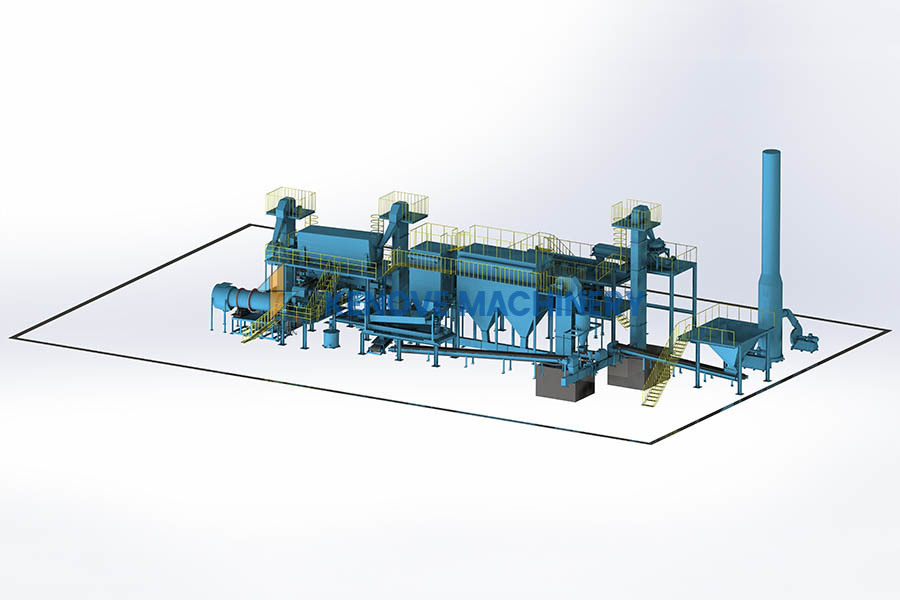Understanding Extrusion Granulation Compound Fertilizer Production: A Comprehensive Overview
Release time:
Sep 22,2025
Extrusion granulation is a pivotal process in the production of compound fertilizers, which are essential for enhancing soil fertility and crop yields. This method involves the combination of raw materials under controlled conditions, resulting in uniformly sized granules that dissolve and release nutrients efficiently in soil. The production of extrusion granulation compound fertilizer is a sophi
Extrusion granulation is a pivotal process in the production of compound fertilizers, which are essential for enhancing soil fertility and crop yields. This method involves the combination of raw materials under controlled conditions, resulting in uniformly sized granules that dissolve and release nutrients efficiently in soil. The production of extrusion granulation compound fertilizer is a sophisticated process that requires a deep understanding of both the agricultural needs and the technological advancements in fertilizer manufacturing.
The process begins with the selection of raw materials, which typically include nitrogen, phosphorus, potassium, and several micronutrients. These components are crucial for plant growth and development. During extrusion, these ingredients are mixed and subjected to high temperatures and pressure, enabling them to bind together and form granules. This not only improves the nutrient release profile but also enhances the physical properties of the fertilizer, such as flowability and handling.
One of the key benefits of extrusion granulation is its ability to produce granules that are more uniform in size and shape compared to other methods, such as dry granulation or wet granulation. Uniform granules ensure that nutrients are distributed evenly in the soil, which is vital for optimal plant uptake. Moreover, the controlled production environment minimizes the risk of dust formation, ensuring that the final product is safer and more user-friendly for farmers.
Extrusion granulation also allows for the customization of fertilizer formulations to meet specific crop needs. For instance, farmers can utilize compound fertilizers tailored for particular soil types or crop varieties, enhancing the efficiency of nutrient application. This adaptability is crucial in modern farming practices, where precision agriculture is gaining traction.
The application of extrusion granulation compound fertilizers goes beyond traditional farming. These fertilizers are also being utilized in horticulture and landscaping, providing a sustainable solution for nutrient management in diverse plant species. The process promotes environmental sustainability by reducing nutrient runoff, which is a significant concern in agriculture today.
In summary, extrusion granulation compound fertilizer production is a critical component of modern agricultural practices. By understanding this process and its benefits, agricultural professionals can make informed decisions about fertilizer use, contributing to enhanced crop yields and sustainable farming practices. As the agricultural sector continues to evolve, the role of innovative production methods like extrusion granulation will become increasingly significant in addressing food security and environmental challenges.
The process begins with the selection of raw materials, which typically include nitrogen, phosphorus, potassium, and several micronutrients. These components are crucial for plant growth and development. During extrusion, these ingredients are mixed and subjected to high temperatures and pressure, enabling them to bind together and form granules. This not only improves the nutrient release profile but also enhances the physical properties of the fertilizer, such as flowability and handling.
One of the key benefits of extrusion granulation is its ability to produce granules that are more uniform in size and shape compared to other methods, such as dry granulation or wet granulation. Uniform granules ensure that nutrients are distributed evenly in the soil, which is vital for optimal plant uptake. Moreover, the controlled production environment minimizes the risk of dust formation, ensuring that the final product is safer and more user-friendly for farmers.
Extrusion granulation also allows for the customization of fertilizer formulations to meet specific crop needs. For instance, farmers can utilize compound fertilizers tailored for particular soil types or crop varieties, enhancing the efficiency of nutrient application. This adaptability is crucial in modern farming practices, where precision agriculture is gaining traction.
The application of extrusion granulation compound fertilizers goes beyond traditional farming. These fertilizers are also being utilized in horticulture and landscaping, providing a sustainable solution for nutrient management in diverse plant species. The process promotes environmental sustainability by reducing nutrient runoff, which is a significant concern in agriculture today.
In summary, extrusion granulation compound fertilizer production is a critical component of modern agricultural practices. By understanding this process and its benefits, agricultural professionals can make informed decisions about fertilizer use, contributing to enhanced crop yields and sustainable farming practices. As the agricultural sector continues to evolve, the role of innovative production methods like extrusion granulation will become increasingly significant in addressing food security and environmental challenges.







